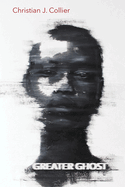
In his first full-length collection, Greater Ghost, poet Christian J. Collier dips his hands into the cold, clear stream of grief and tries over and over again to give shape to loss despite its tendency to slip through grasping fingers. In "Ghost [Tether]," he names grief "a bruise-bodied, faceless god," and, in "Boot Hill," cries out, "& I say speak, Lord, tell me// what is time but a shaky way/ to try to measure what can never be had back?"
Collier's voice is laced with a tender confidence, a swagger governed by humility and a sure knowledge of his identity as a Black man in the American South, a place, he says, where "we sacred all we can to stay living, holy what is ours/ before some rabid hand wrestles it away." The ghosts Collier carries take many forms, some more substantial than others. All have left their mark, but perhaps none more than a child conceived but miscarried. This trauma often remains hidden, especially for fathers, but Collier honors that pain by expressing "the grief we could no longer cradle" across multiple poems, asking in "Submission," "Tell me/ how exactly/ does one journey away from these ruins, step outside them." Collier puts the page to good use by carefully arranging each line and employing black bars to obscure the names of lost loved ones. These elements provide a strong visual effect, but it is the emotional truth of each poem that elevates this collection. --Sara Beth West, freelance reviewer and librarian

